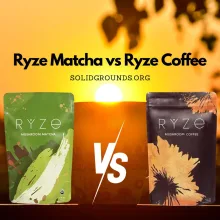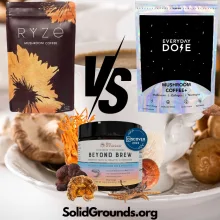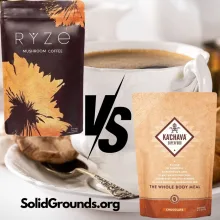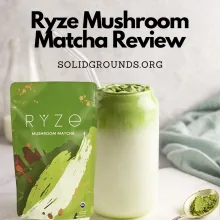Everyday Dose vs Ryze | Solid Grounds
The rise of mushroom coffee offers a unique blend of benefits beyond just caffeine, including enhanced focus, sustained energy, immune support, and improved gut health. Two leading brands in this burgeoning market are Everyday Dose and Ryze. Everyday Dose features coffee extract, collagen, chaga, lion’s mane, and L-theanine, providing a low-caffeine option with 80% less caffeine than regular coffee. Ryze combines organic mushrooms like cordyceps, reishi, lion’s mane, and turkey tail with coffee, MCT oil, and coconut milk for a rich, indulgent flavor.
While Everyday Dose excels in lower caffeine and Ryze in flavor and maximum mushroom dosages, both incorporate ingredients for clean energy, focus, and immune support. Ultimately, Everyday Dose caters to those seeking a gentler caffeine boost, while Ryze appeals to those prioritizing robust flavor and higher mushroom potency. As functional beverages gain popularity, these brands offer distinct options for health-conscious consumers.
Everyday Dose vs Ryze Comparison Table
 Everyday Dose VS Ryze |  Everyday Dose |  Ryze |
Caffeine Level | (80% less caffeine than regular coffee) | (50% less caffeine than regular coffee) |
Flavor/Texture | (Smooth coffee flavor, but potentially gritty texture) | (Rich, creamy flavor from coconut milk and MCT oil) |
Ingredient Variety/Potency | Chaga, lion's mane, collagen, L-theanine) | (Diverse organic mushroom blend including cordyceps, reishi, lion's mane, turkey tail) |
Brand Story/Mission | (Focus on functional ingredients) | (Founded by individuals seeking a healthier coffee alternative) |
Price/Value | (About $1.33 per serving) | (About $0.90 per serving) |
Overall Rating | Overall Rating: 7.2/10 | Overall Rating: 8/10 |
Latest Price |  |  |
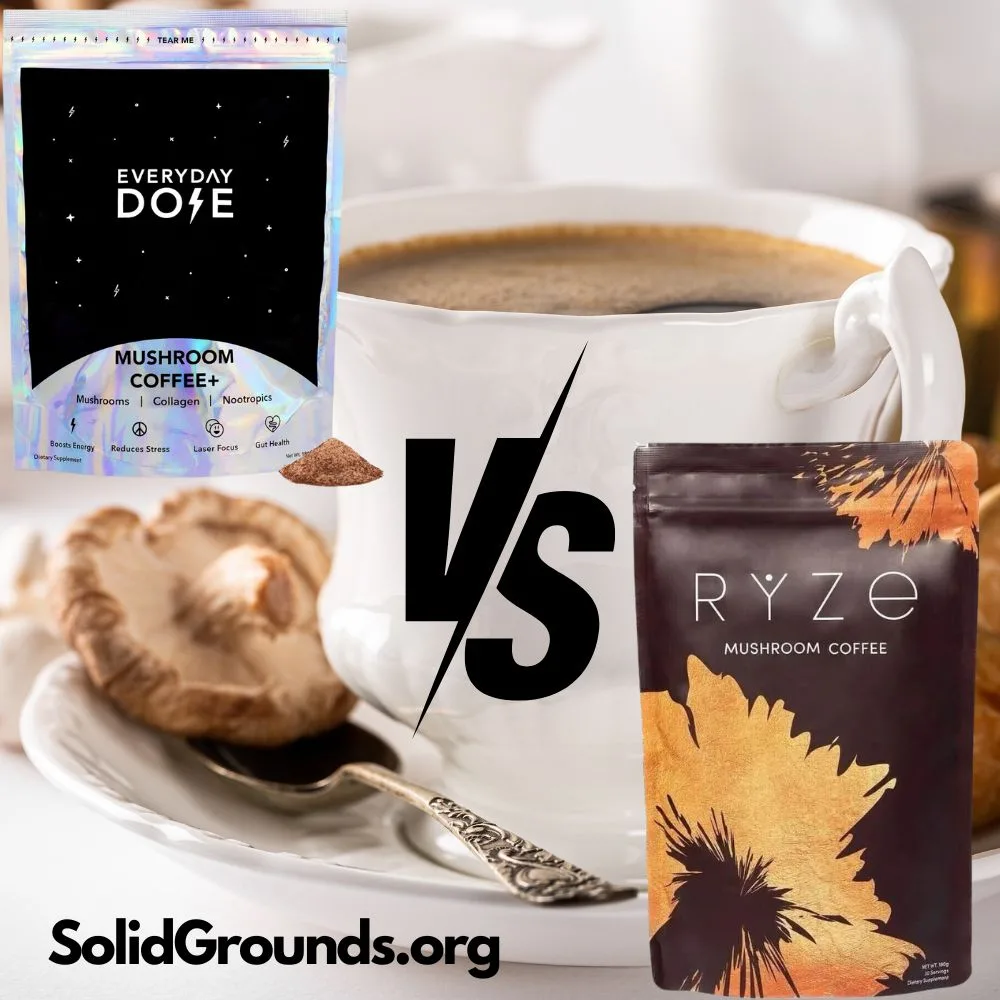
The Rise of Mushroom Coffee: A Comprehensive Look at Everyday Dose vs Ryze
In recent years, the world of functional beverages has witnessed a remarkable surge in the popularity of mushroom coffee. As people become increasingly conscious of their health and well-being, the desire for beverages that offer more than just a caffeine kick has grown. Mushroom coffee promises a unique blend of benefits, including enhanced focus, sustained energy, immune support, stress reduction, and improved gut health. Two brands leading the charge in this burgeoning market are Everyday Dose and Ryze, each offering their unique take on this innovative beverage.
Product Overview: What Sets Them Apart?
Everyday Dose’s mushroom coffee is a carefully crafted blend of coffee extract, collagen protein, the adaptogenic mushrooms chaga and lion’s mane, and the amino acid L-theanine. With just 25 calories per serving, this low-caffeine option boasts an impressive 80% less caffeine than regular coffee, making it an attractive choice for those seeking a gentler energy boost. Everyday Dose’s products are available in both premixed powders and convenient single-serve packets, catering to various consumer preferences.
On the other hand, Ryze takes a different approach, combining organic mushrooms like cordyceps, reishi, lion’s mane, and turkey tail with coffee, MCT oil, and creamy coconut milk. Founded by Andrée and Rashad, who sought a healthier alternative to their caffeine dependency, Ryze’s mushroom coffee is a testament to their commitment to holistic well-being. Offered in sleek tins and grab-and-go pouches, Ryze’s products cater to those seeking a bold, indulgent mushroom coffee experience.
The Benefits: A Closer Look
Both Everyday Dose and Ryze incorporate ingredients renowned for their ability to provide clean, focused energy without the dreaded jitters. Cordyceps and lion’s mane, present in both blends, are believed to enhance concentration and cognitive function. Additionally, the inclusion of immunity-boosting mushrooms like turkey tail, reishi, and chaga in these mushroom coffees may support gut health and bolster the body’s natural defenses.
While Ryze’s blend contains the adaptogen reishi, known for its stress-relieving properties, Everyday Dose opts for the amino acid L-theanine, which can promote feelings of calmness and relaxation. Numerous studies have highlighted the potential antioxidant, anti-inflammatory, and neuroprotective effects of various mushrooms, lending scientific credence to the purported benefits of these innovative beverages.
Taste and Texture: A Sensory Experience
Everyday Dose’s mushroom coffee is praised for its light, smooth coffee flavor, though some consumers have noted a slightly gritty or powdery texture. In contrast, Ryze’s offering boasts a rich, creamy mouthfeel thanks to the addition of coconut milk and MCT oil, paired with a bold coffee taste that aims to please even the most discerning palates.
Preparation and Usability
Both Everyday Dose and Ryze mushroom coffees can be conveniently brewed by simply mixing the powder into hot water. However, the versatility of these products extends beyond the traditional cup of joe. The unique blend of ingredients allows for their incorporation into various culinary applications, from baking to cooking, opening up a world of possibilities for the adventurous home chef.
It’s worth noting that while Everyday Dose offers a lower caffeine option with around 80mg per serving, Ryze’s mushroom coffee contains the full caffeine level found in traditional coffee. This is an essential consideration for those monitoring their caffeine intake or seeking a gentler energy boost.
Brand Factors: Price, Quality, and Sustainability
When it comes to pricing, Everyday Dose’s 30-serving package retails for $39.99, or $1.33 per serving, while Ryze’s offering is priced at $27 for 30 servings, or $0.90 each. Both brands offer subscription options that can save consumers between 10-15% on their purchases.
In terms of sourcing and quality, both Everyday Dose and Ryze prioritize the use of premium coffee beans. Ryze takes an extra step by utilizing organic mushrooms extracted through dual processes, though certifications from third-party organizations are limited for both brands.
Sustainability is a shared priority, with both companies taking measures to reduce their environmental impact through initiatives like compostable packaging. However, it’s important to note that their specific sustainability efforts and social impacts may differ.
Availability is currently limited to online ordering for both brands, though future expansion into brick-and-mortar retail spaces cannot be ruled out.
Pros, Cons, and Best Use Cases
When it comes to Everyday Dose, the lower caffeine content is a significant pro for those seeking a gentler energy boost or looking to reduce their caffeine intake. However, the potential downside lies in the reported gritty or powdery texture, which may not appeal to all palates.
Ryze, on the other hand, shines in terms of its rich, indulgent flavor profile, thanks to the addition of coconut milk and MCT oil. However, the full caffeine level may be a deterrent for those looking to moderate their caffeine consumption.
For individuals seeking the focus and immune benefits of mushroom coffee in a lower caffeine form, Everyday Dose emerges as the ideal choice. Conversely, if you prioritize a robust flavor experience and maximum mushroom dosages, Ryze’s offering may be the better option – with the caveat of monitoring your caffeine intake.
Ultimately, both Everyday Dose and Ryze present high-quality mushroom coffee options, each catering to different preferences and needs within the functional beverage space.
Final Recommendation and Conclusion
In the rapidly evolving world of functional beverages, the rise of mushroom coffee has been a game-changer, offering a unique blend of benefits that extend far beyond a simple caffeine kick. Everyday Dose and Ryze have established themselves as pioneers in this burgeoning market, each offering a distinct take on this innovative beverage.
While Everyday Dose caters to those seeking a gentler energy boost and a lower caffeine option, Ryze appeals to those who prioritize a rich, indulgent flavor experience and maximum mushroom dosages. Both brands have their strengths and potential drawbacks, but ultimately, the choice comes down to individual preferences and needs.
As the demand for functional beverages continues to grow, it’s clear that mushroom coffee is more than just a passing trend. With their unique blend of ingredients and purported benefits, brands like Everyday Dose and Ryze are poised to captivate an ever-growing audience of health-conscious consumers seeking a more holistic approach to their daily pick-me-up.
 |  |
FAQs and Answers
What are the main differences in ingredients between Everyday Dose and Ryze mushroom coffees?
The main differences in ingredients between Everyday Dose and Ryze mushroom coffees are:
Everyday Dose:
- Coffee extract
- Collagen protein
- Chaga mushroom
- Lion’s mane mushroom
- L-theanine (amino acid)
Ryze:
- Coffee
- Organic mushroom blend (cordyceps, reishi, lion’s mane, turkey tail, shiitake, king trumpet)
- MCT oil
- Coconut milk
Key differences:
- Everyday Dose includes collagen protein, which Ryze doesn’t.
- Ryze has a more diverse mushroom blend, including cordyceps, reishi, turkey tail, shiitake, and king trumpet, which are not in Everyday Dose.
- Ryze includes MCT oil and coconut milk, creating a creamier base.
- Everyday Dose contains L-theanine for promoting calmness, which is not present in Ryze.
- Ryze uses whole coffee, while Everyday Dose uses coffee extract.
These differences result in distinct nutritional profiles and potential benefits for each product.
How do the caffeine levels compare between Everyday Dose and Ryze mushroom coffees?
The caffeine levels between Everyday Dose and Ryze mushroom coffees differ significantly:
Everyday Dose:
- Contains approximately 80mg of caffeine per serving
- Advertised as having 80% less caffeine than regular coffee
- Designed for those seeking a gentler energy boost or looking to reduce caffeine intake
Ryze:
- Contains the full caffeine level found in traditional coffee
- While the exact amount isn’t specified in the article, a typical cup of coffee contains about 95-200mg of caffeine
Key comparison points:
- Everyday Dose offers a low-caffeine option, while Ryze provides a full-caffeine experience.
- Everyday Dose is more suitable for those sensitive to caffeine or looking to reduce their intake.
- Ryze may be preferable for those who want the full caffeine kick of regular coffee along with the benefits of mushrooms.
- The significant difference in caffeine levels is an essential consideration for consumers when choosing between these two products.
It’s important to note that individual caffeine sensitivity and daily intake goals should guide the choice between these two options.
Which brand offers better value for money, Everyday Dose or Ryze?
Based on the information provided in the article, we can compare the value for money between Everyday Dose and Ryze:
Everyday Dose:
- Price: $39.99 for 30 servings
- Cost per serving: $1.33
Ryze:
- Price: $27 for 30 servings
- Cost per serving: $0.90
Comparison:
- Price per serving: Ryze is significantly cheaper at $0.90 per serving compared to Everyday Dose at $1.33 per serving.
- Savings: Ryze is $0.43 cheaper per serving, which is about 32% less expensive than Everyday Dose.
- Subscription options: Both brands offer subscription options that can save consumers between 10-15% on their purchases.
- Ingredients: While Ryze is cheaper, it’s important to note that it contains a more diverse mushroom blend and additional ingredients like MCT oil and coconut milk.
- Caffeine content: Everyday Dose offers a low-caffeine option, which might be valuable for certain consumers despite the higher price.
Given these factors, Ryze appears to offer better value for money in terms of price per serving and ingredient diversity. However, value is subjective and depends on individual preferences and needs. For those specifically seeking a low-caffeine option, Everyday Dose might provide better value despite the higher price.
It’s also worth noting that both brands offer subscription options for additional savings, which could further affect the value proposition for regular consumers.
How do the taste and texture profiles differ between Everyday Dose and Ryze mushroom coffees?
Based on the information provided in the article, the taste and texture profiles of Everyday Dose and Ryze mushroom coffees differ significantly:
Everyday Dose:
- Taste: Described as having a light, smooth coffee flavor.
- Texture: Some consumers have noted a slightly gritty or powdery texture.
Ryze:
- Taste: Boasts a bold coffee taste.
- Texture: Offers a rich, creamy mouthfeel.
Key differences:
- Flavor intensity: Everyday Dose has a lighter flavor profile, while Ryze provides a bolder taste.
- Creaminess: Ryze has a creamier texture due to the addition of coconut milk and MCT oil, which are not present in Everyday Dose.
- Consistency: Everyday Dose may have a slightly gritty texture, while Ryze aims for a lump-free, smooth consistency.
- Base ingredients: The difference in taste likely stems from Everyday Dose using coffee extract, while Ryze uses whole coffee.
- Additional flavors: Ryze’s coconut milk and diverse mushroom blend may contribute additional flavor notes not present in Everyday Dose.
It’s important to note that taste preferences are subjective, and what appeals to one person may not appeal to another. The choice between these two options may depend on whether an individual prefers a lighter, potentially grittier coffee experience (Everyday Dose) or a bolder, creamier one (Ryze).
Which brand is better for those seeking specific benefits like reduced stress or improved focus?
Based on the information provided in the article, both Everyday Dose and Ryze offer ingredients that can potentially help with stress reduction and improved focus, but they approach these benefits in slightly different ways:
For Reduced Stress:
- Everyday Dose:
- Contains L-theanine, an amino acid known to promote feelings of calmness and relaxation.
- The lower caffeine content (80% less than regular coffee) may be beneficial for those sensitive to caffeine-induced stress or anxiety.
- Ryze:
- Includes reishi mushroom, known for its stress-relieving properties as an adaptogen.
- However, it contains full caffeine levels, which might be less suitable for those sensitive to caffeine’s effects on stress.
For Improved Focus:
- Everyday Dose:
- Contains lion’s mane mushroom, believed to enhance concentration and cognitive function.
- The combination of lower caffeine and L-theanine may provide a more balanced, focused energy without jitters.
- Ryze:
- Also contains lion’s mane mushroom for cognitive benefits.
- Includes cordyceps, which is believed to enhance focus and energy.
- The full caffeine content may provide a stronger immediate boost to alertness and focus.
Conclusion:
- For reduced stress: Everyday Dose might be better due to its L-theanine content and lower caffeine levels.
- For improved focus: Both brands offer benefits, but the choice depends on individual caffeine tolerance and preferences. Ryze might provide a stronger immediate focus boost, while Everyday Dose offers a more gentle, sustained focus.
It’s important to note that the effectiveness of these ingredients can vary from person to person, and these products should not be considered as replacements for medical treatments for stress or attention disorders. Individuals with specific health concerns should consult with a healthcare professional before incorporating these products into their routine.

